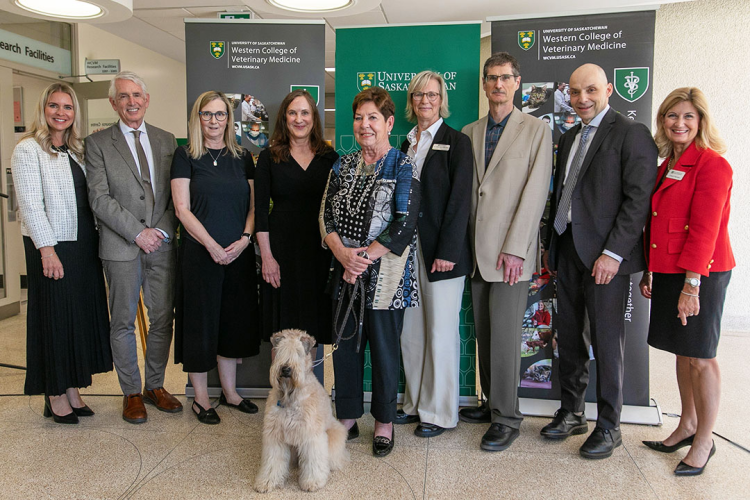The Western College of Veterinary Medicine (WCVM) at the University of Saskatchewan (USask) is celebrating the opening of a new magnetic resonance imaging (MRI) machine and a linear accelerator part of a vital animal health care and education project that wouldn't have been possible without significant support from donors.
The project, which began in March 2025, included extensive renovations to diagnostic and treatment suites at the college's Veterinary Medical Centre (VMC), followed by installation of the new equipment. The project's total cost was $9.1 million, with donors from across Canada contributing more than $5 million in support of the animal health care initiative at the college's primary care and referral hospital.

From left: Melissa Mann, WCVM director of development; Peter Stoicheff, USask president; Dana Brass, Saskatoon pet owner; Dr. Monique Mayer, WCVM radiation oncologist; Cathy Roozen, WCVM donor, and her dog Timber; Dr. Gillian Muir, WCVM dean; Keith Lofvendahl, WCVM donor; Vince Bruni-Bossio, USask provost and vice-president of academic; and Cheryl Hamelin, USask vice-president of University Relations.
"This advancement in technologies at the WCVM is a direct result of the ongoing generosity of our donor community," said USask President and Vice-Chancellor Peter Stoicheff. "The new MRI machine and linear accelerator will not only modernize animal health in Saskatchewan and beyond, but it will help provide our students with the education and training they need to become the veterinarians of the future. This project is a primary example of how the collective power of community can create tangible and lasting impact."
Western Canadian animal owners and referring veterinarians now have access to a 3 Tesla MRI unit that produces highly detailed images for diagnosing animal patients and developing treatment plans. The new linear accelerator, a vital tool for treating pets with cancer, optimizes image-guided radiotherapy and provides high-speed radiation treatment.
Both technologies are part of the college's oncology and medical imaging services, which include a PET-CT (positron emission tomography-computed tomography) unit. Altogether, these advanced technologies offer specialized care to animal patients as well as invaluable hands-on training experience for WCVM veterinary students and graduate veterinarians.
The WCVM was the first veterinary college in Canada to install its own MRI unit in 2002, which was replaced with an updated model in 2013. The WCVM hospital was also one of the first Canadian facilities to offer advanced radiation therapy techniques for animals using the linear accelerator. After much use, both the MRI unit and linear accelerator were aging and had substantial mechanical issues, compelling the WCVM to permanently shut them down.
"When the WCVM urgently needed to replace two critical technologies in our hospital, we were overwhelmed by the incredible response from our family of supporters. Their financial commitment allowed us to efficiently consolidate the installation process and move ahead with important renovations," said WCVM Dean Dr. Gillian Muir.
"Many of our donors have beloved pets of their own, so they understand why our clinical teams need advanced medical equipment to care for critically ill patients and to help train Western Canada's future veterinarians and specialists."
The donors' contributions toward the animal health care project were part of USask's Be What the World Needs campaign the most successful fundraising campaign in the university's history. The 10-year campaign, which wrapped up in June 2025, raised more than $570 million for a variety of projects, priorities and places across USask campuses.
The WCVM, which turned 60 in 2025, is a world-class institution with more than 3,500 veterinary graduates from its Doctor of Veterinary Medicine (DVM) program. The college's full-service veterinary teaching hospital, which plays a critical role in students' clinical training, also serves as a primary care and referral hub for western Canadian veterinarians and animal owners. The VMC's clinical services for companion animals, horses, livestock and wildlife recorded more than 22,000 patient visits in 2024-25.










